

A doomed Russian passenger jet lurched up and down before plunging 31,000 feet after being blown apart by an "external impact", airline bosses have revealed.
Travellers still strapped in their seats were sucked from the stricken Airbus A321 through a hole at the back of the jet when the tail blew off 23 minutes after leaving the Egyptian Red Sea resort of Sharm El Sheikh, it was claimed.
The plane twice abruptly climbed nearly 3,000 feet in three seconds before falling 3,000 feet moments later in the final minutes before disappearing from radar, crashing in the Sinai peninsula with the loss of all 224 passengers and crew.
The news comes as US officials claim an American infra-red satellite detected a heat flash on the route the aircraft was taking seconds before the plane fell from the sky, suggesting there was some sort of explosion on board.
The data does not show the heat flash travelling at any time, as would be the case had a ground-to-air missile been launched in the plane's direction.
Instead, the satellite evidence illustrates that there was just a single burst of ferocious heat on the jet's path.
That has now opened up the possibility that a bomb on board, or an explosion in a fuel tank or engine as the result of a mechanical failure, caused the plane to come down.
A US official stressed that the infra-red data meant any speculation that a missile had been launched at the jet was simply "off the table".
As the first coffins of the victims – who included 17 children – were taken home to Russia on Monday. UK Prime Minister David Cameron said security officials were "looking very carefully" at whether there was any safety risk to British holidaymakers travelling to the Red Sea.
Bosses at carrier Metrojet ruled out a technical fault or pilot error, indicating that a bomb or missile strike brought down the jet. Alexander Smirnov, the airline’s deputy general director, said: "The only possible explanation could be an external impact on the airplane."
He refused to say what type of impact could have caused the crash but said the St Petersburg-bound Airbus was reliable and would not fall into a spin even if the pilots made a grave error because its automatic systems would correct crew mistakes.
The captain did not make a mayday call or contact traffic controllers before the crash, airline bosses added, contradicting earlier claims by an Egyptian official that the pilot radioed complaining saying he wanted to land at the nearest airport because of technical problems.
British military analyst Paul Beaver said he thought the crash was most likely to have been caused by a bomb on board.
He said he was certain that Islamic State – which initially claimed it had shot down the jet – did not possess a missile system capable of hitting the plane.
"I’m pretty convinced that Islamic State doesn’t have a 'double-digit' SAM (surface-to-air missile) that is necessary to go up as far as 31,000 feet," he said. "That’s a very serious piece of equipment, and I don’t think they have that sophistication."
He also said the Sinai desert is well scrutinised by intelligence agencies, so a missile would have been seen. But US Director of National Intelligence James Clapper said there was no "direct evidence" that terrorists brought down the jet and said no firm conclusions could be reached until an investigation was complete.
However, he noted that IS did have a significant presence in parts of Egypt’s Sinai peninsula.
Alexander Neradko, the head of the Russian aviation agency, also claimed Metrojet’s comments were "premature and not based on any real facts".
He urged aviation experts "to refrain from drawing conclusions" until officials have studied the scattered fragments of the plane in Sinai and the content of its black boxes.
Confusion surrounding the cause of the crash and the safety of the area caused concerns for the 900,000 Britons who visit Egypt every year, many to enjoy winter sunshine in the Red Sea resorts of Sharm and Hurghada.
Several major airlines including Lufthansa, Air France-KLM and Qatar Airways said they would avoid flying over the Sinai peninsula while they waited for clarity on what brought the jet down.
British airlines that fly to Red Sea resorts said they do not fly over the affected parts of Sinai.
Mr Cameron told ITV’s This Morning: "If it’s not safe, if certain routes aren’t safe or certain things aren’t safe, of course we will act. But we must do it on the basis of evidence and not on speculation."
Asked if he would take his own family on a flight to the area, he said: "I would always follow the travel advice and the travel advice is very clear for that part of the world: We don’t advise travel to parts of Sinai, but actually to Sharm El Sheikh we haven’t changed the travel advice."
A Russian cargo plane returned the first bodies of victims killed in the crash to St Petersburg on Monday, which is holding three days of mourning.
The plane carried 130 bodies that were taken to a morgue and a crematorium, where forensic experts immediately began working to try to identify the victims.
 |
Day|Week

 World's most heart-pounding bridges
World's most heart-pounding bridges First Glass Suspension Bridge in China Opens to Visitors
First Glass Suspension Bridge in China Opens to Visitors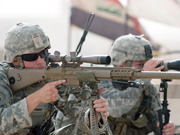 The world famous machine guns
The world famous machine guns
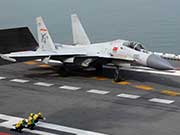 In pics: J-15 Carrier-Based Fighter takes off from Liaoning aircraft carrier
In pics: J-15 Carrier-Based Fighter takes off from Liaoning aircraft carrier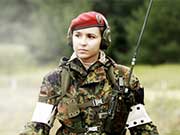 In pics: army beauties across world
In pics: army beauties across world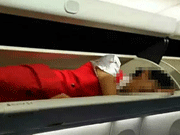 Air stewardesses packed into overhead bin
Air stewardesses packed into overhead bin China enters Go Away, Mr. Tumor for 88th Oscars
China enters Go Away, Mr. Tumor for 88th Oscars Highlights of the National Day holiday
Highlights of the National Day holiday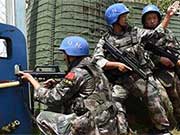 Chinese peacekeeping forces in South Sudan encounter armed conflicts
Chinese peacekeeping forces in South Sudan encounter armed conflicts "Luxury" art apples debut in Shanghai
"Luxury" art apples debut in Shanghai